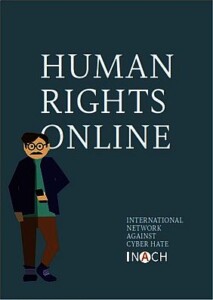 INACH, the International Network against Cyber Hate, is a foundation under Dutch law, with a board as governing unit. INACH has its office/secretariat in Amsterdam. INACH has more than 20 members around the world who consist of organizations handling complaints concerning discrimination on Internet who are able to work independently from the network (self-supporting). INACH’s new booklet about online hate is online available. This booklet will enable readers to have a better understanding of INACHs work, vision, mission and goal.
INACH, the International Network against Cyber Hate, is a foundation under Dutch law, with a board as governing unit. INACH has its office/secretariat in Amsterdam. INACH has more than 20 members around the world who consist of organizations handling complaints concerning discrimination on Internet who are able to work independently from the network (self-supporting). INACH’s new booklet about online hate is online available. This booklet will enable readers to have a better understanding of INACHs work, vision, mission and goal.
How to deal with hate on the internet? MEET discussion meeting in Vienna, 4 June 2018
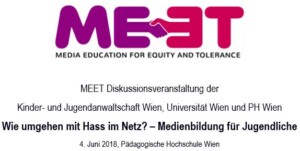 Cyberbullying, fake news, hate speech – these terms have long since become part of everyday school life. Online, rumors and hate messages spread faster than ever, opinions are sold as facts and behind it is an algorithm that is hard to see through. For the schools, online media are another challenge and usually they are left alone. The MEET discussion event analyzes the mechanisms of lies and hate in the net and presents concrete tools and strategies for media education in schools.
Cyberbullying, fake news, hate speech – these terms have long since become part of everyday school life. Online, rumors and hate messages spread faster than ever, opinions are sold as facts and behind it is an algorithm that is hard to see through. For the schools, online media are another challenge and usually they are left alone. The MEET discussion event analyzes the mechanisms of lies and hate in the net and presents concrete tools and strategies for media education in schools.
Digital civil courage? Thursday, June 7th 2018, 5 – 7pm, Berlin
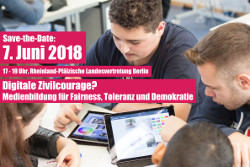 Digital civil courage?
Digital civil courage?
Media education for Equity, Tolerance and Democracy
Thursday, June 7th 2018, 5 – 7pm
Rheinland-Pfälzische Landesvertretung Berlin, In den Ministergärten 6
Continue reading “Digital civil courage? Thursday, June 7th 2018, 5 – 7pm, Berlin”
MEET goes to school in Ljubljana
MEET testing at the Secondary School of Technical Professions Šiška in Ljubljana (SLO)
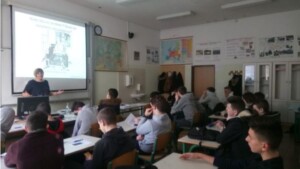
In Slovenia the MEET’s classroom activities started in December 2017 at the secondary school of Technical Professions Šiška in Ljubljana. The researcher/media educator Mojca Frelih along with the teacher Andrej Svete and 28 students (aged 15-16) tested the Learning Scenario “Migration between Media Narratives and Digital Storytelling”.
MEET goes to school in Prato
 In Italy the MEET’s classroom activities started in November 2017 at the secondary school Gramsci-Keynes in the town of Prato. The researcher/media educator Francesco Fabbro along with 3 teachers (Luca Cappelli, Giuseppe Consentino and Silvia Ermini) and 18 students (age 16-18) tested the Learning Scenario “Challenge violence and play your rights”. Students firstly engaged in media analysis oriented activities focusing in particular on the representation of violence and migrants in videogames and movies. In the second part of the Learning Scenario, students created some fictional game stories inspired to real episodes where human rights were violated or contested. Afterward, they developed different aspects of their game stories (e.g. definition of game play and characters) through which struggles for equal rights were represented and advocated.
In Italy the MEET’s classroom activities started in November 2017 at the secondary school Gramsci-Keynes in the town of Prato. The researcher/media educator Francesco Fabbro along with 3 teachers (Luca Cappelli, Giuseppe Consentino and Silvia Ermini) and 18 students (age 16-18) tested the Learning Scenario “Challenge violence and play your rights”. Students firstly engaged in media analysis oriented activities focusing in particular on the representation of violence and migrants in videogames and movies. In the second part of the Learning Scenario, students created some fictional game stories inspired to real episodes where human rights were violated or contested. Afterward, they developed different aspects of their game stories (e.g. definition of game play and characters) through which struggles for equal rights were represented and advocated.
How “Multi-Culti Can Work” – Media Education for Intercultural Tolerance
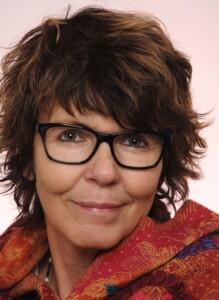 Katja Friedrich, How “Multi-Culti Can Work” – Media Education for Intercultural Tolerance, Journal THEMA JUGEND No. 1/2018: „Wir können Frieden“ (We can make peace)
Katja Friedrich, How “Multi-Culti Can Work” – Media Education for Intercultural Tolerance, Journal THEMA JUGEND No. 1/2018: „Wir können Frieden“ (We can make peace)
Tolerance and equity are key values of our democratic societies and form the basis for our peaceful co-existence. However, hate speech, discriminating or racist statements, and disinformation are on the rise – online and offline. Due to their intensive use of digital media, young people in particular are confronted with prejudice, fake news, and manipulative images, and are even exposed to extremist rhetoric that targets them intentionally. How can educational institutions respond adequately to this? How can everyone learn together to develop and express a respectful posture towards the “other”?
The European project “MEET” (Media Education for Equity and Tolerance) addresses this very issue: how can young people learn to see through the mechanisms of propaganda and discrimination and in doing so cultivate more constructive ways of expressing their own opinions? Since 2016, the project consortium with members in five European countries, among them medien+bildung.com in Ludwigshafen, has been developing learning scenarios for young people aged 13 through 19 in order to promote a critical and intercultural understanding of media as well as the ability to use media more consciously.
Young people and educators are being integrated into an “action research” process – research that is practically oriented and aims, in a mutual effort, at giving viable form to methods for intercultural media education.
Continue reading “How “Multi-Culti Can Work” – Media Education for Intercultural Tolerance”
Students from Ludwigshafen report on their MEET workshops
 From October 2017 to January 2018, students and teachers of the Ludwigshafen schools Ernst-Reuter-Realschule plus and the Berufsbildende Schule Technik 1 actively participated in the project “MEET”. As part of the “Safer Internet Day 2018” on February 6th, the 10th grade of the Ernst-Reuter Realschule plus and the 11th grade of the BBS Technik 1 presented the results of the workshops on opinion-giving and prejudice, propaganda and counter speech in the conference room of the Landeszentrale für Medien und Kommunikation Rheinland-Pfalz (Media Authority of Rhineland-Palatinate) in Ludwigshafen, Germany.
From October 2017 to January 2018, students and teachers of the Ludwigshafen schools Ernst-Reuter-Realschule plus and the Berufsbildende Schule Technik 1 actively participated in the project “MEET”. As part of the “Safer Internet Day 2018” on February 6th, the 10th grade of the Ernst-Reuter Realschule plus and the 11th grade of the BBS Technik 1 presented the results of the workshops on opinion-giving and prejudice, propaganda and counter speech in the conference room of the Landeszentrale für Medien und Kommunikation Rheinland-Pfalz (Media Authority of Rhineland-Palatinate) in Ludwigshafen, Germany.
Continue reading “Students from Ludwigshafen report on their MEET workshops”
Mainz/Frankfurt: Democracy Day and GMK Forum

On 6th November Katja Mayer (medien+bildung.com) presented MEET at the “Forum Quo Vadis Europa” at the Democracy Day in Mainz. 12 days later, on 18 November, Prof. Maria Ranieri (University of Florence) explained the MEET project at the GMK workshop on “International Media Education” in Frankfurt.
Continue reading “Mainz/Frankfurt: Democracy Day and GMK Forum”
Testing phase in Lendava, Slovenia
 Mid-November, Iztok Šori from the Mirovni inštitut has carried out a pilot lesson at The Bilingual Secondary School Lendava, in the north-east of Slovenia.
Mid-November, Iztok Šori from the Mirovni inštitut has carried out a pilot lesson at The Bilingual Secondary School Lendava, in the north-east of Slovenia.
Iztok Šori, PhD in Sociology (Faculty of Arts, University of Ljubljana, 2012), is a researcher at the Mirovni inštitut (Peace Institute) in Ljubljana. He has participated in several research projects that addressed gender equality, political representation and emancipation, prostitution, trafficking in persons, racism, populism, migration and lifestyles.
The school in Lendava is one of six test schools in Slovenia, Italy and Germany, where learning scenarios of MEET are being tested. Also in Lendava, a coordinated plan will be used to make video recordings that will be used in the joint documentary film of the MEET project.
Have you seen our new leaflets?

You can now download our new leaflet in each national language of the MEET project (French, German, Italian, Slovenian) and off course in English! Continue reading “Have you seen our new leaflets?”

